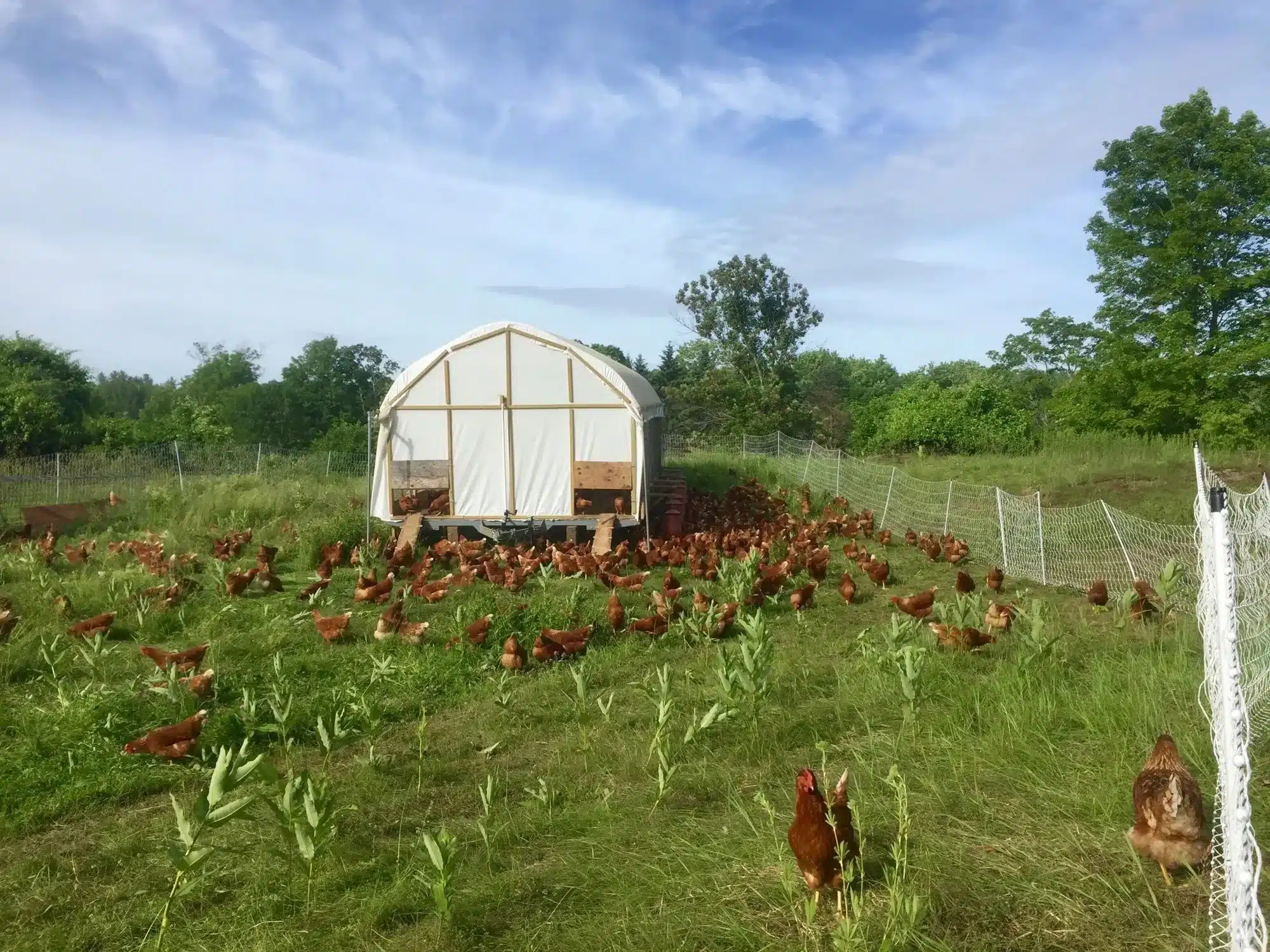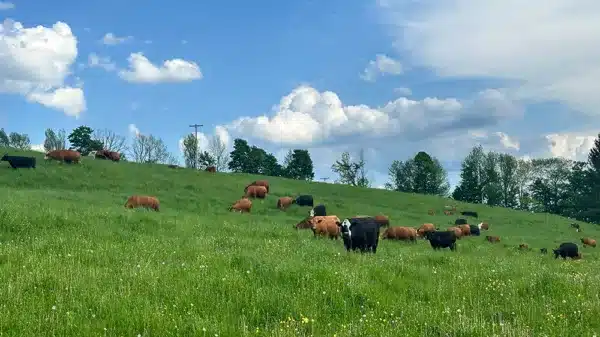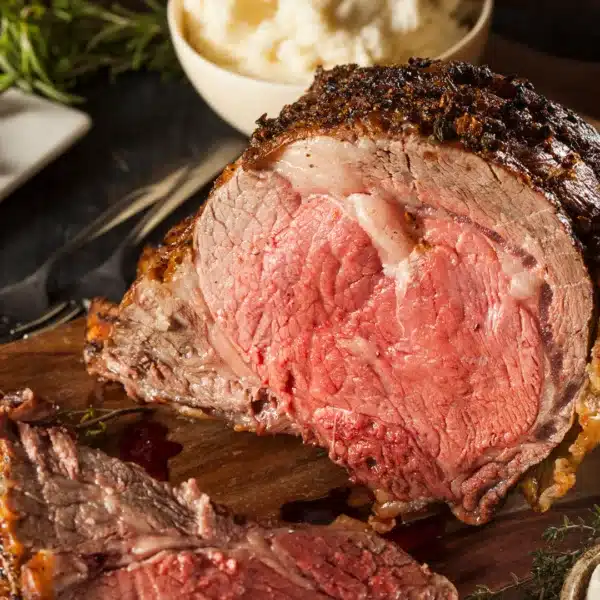Partner Farmers: Catarina and Luke Mahoney

Catarina and Luke Mahoney are first-generation farmers based out of Canterbury, New Hampshire. They run a diversified operation, which means they produce chicken, pork, beef, and organic vegetables on their 613-acre farm. They also produce some of the best grass-fed cheese in New England.
“We’re a farmstead creamery, that’s something that’s very unique to what we do,” said Mahoney, whose farm produces a variety of cheeses, including raw, smoked, and cloth-wrapped cheddar, gouda, blue, feta, and many more. All of their cheeses come from 100 percent grass-fed cows. “That means that we have control of the quality from all the way back to the soil, through the forages, through the cow and the cow’s health, through the milk, and, then, into the finished cheese, which gets aged in some cases for up to two years.”
Controlling both sides of the cheese-making operation—the farming and the producing—is rare. The vast majority of cheese producers, even those whose products are found at farmer’s markets and in specialty stores, buy their milk from a supplier. Catarina, who studied cheese making in Vermont, is in charge of the creamery on Mahoney’s farm and does everything from managing the staff to perfecting the recipes. The creamery was built just after the Mahoneys moved to Canterbury, and can process milk from 100 cows. Having control over the whole process helps the Mahoneys ensure quality, it also allows them to produce the best cheese for the season.
“The summertime is better for processing the Alpine Swiss, the Dudley’s Dance (a semi-hard cheese with a sweet Swiss cheese taste), and the Gouda. The cheddars can be made year-round,” said Mahoney. “A lot has to do with when the cows are inside the barn, they’re basically eating fermented grass, like in the wintertime. That will especially affect the gouda family of cheeses.”
Gouda, one of the most popular cheeses worldwide, is a Dutch cheese that’s been around for over one thousand years and is a favorite with Mahoneys’ customers. Gouda’s taste matures with age, taking on a bolder, nutty or buttery flavor, where younger gouda is soft, mild, sweet, and creamy. The Mahoneys’ gouda is so good because they time their production to coincide with the cycles of grass growth on their farm. Another reason is the breed of cow, Normande, which is celebrated for the milk and cheese they produce.
“My wife will say that the best gouda is produced in the fall,” said Mahoney. “It’s something about the way the grasses are more balanced from a protein-to-energy point of view, which makes milk that’s more balanced protein-to-fat. A good milk protein-to-fat ratio is what a cheesemaker is looking for.”
The Mahoneys met in 1999 on a biodynamic farm outside of St. Petersburg. After five years they moved to a farm outside of Hamburg, Germany. There, they continued their biodynamic education before coming to New Hampshire in 2007 and setting up shop. In 2012, the Mahoneys moved one last time to their current location, on top of what used to be a sod farm.
“I would say sod farming has to be one of the most destructive forms of farming—basically they roll up the grass, but with that grass and the roots comes a half-inch of topsoil, annually,” said Luke Mahoney, who has spent years rebuilding the soil—and grass—on his farm. “But, grass is the primary driver of what we do, and how it grows has a huge impact on how well we do here.”
Biodynamic agriculture is believed to be the first form of modern organic farming. Dating back to a 1924 lecture by Austrian philosopher Rudolph Steiner, biodynamic agriculture excludes the use of synthetic fertilizers, promotes healthy soil conditions, and views the entire farm—from crops to animals—as part of one system in both a scientific and spiritual way. The Mahoneys’ farm is more “inspired by biodynamics”—they use the waste from one stream to feed the next and ultimately diversify the farm’s output.
“We started with the dairy, which was the driver,” said Mahoney. “The waste products of the dairy drive the pork and the waste products from the dairy and the manure drive the fields and the cropping production, which drive the beef. So a lot of that is just utilizing the dairy to its fullest.”
The road has not always been easy for the Mahoneys, as first-generation farmers, and a lot has changed since they first started their operation. With 15 full-time employees and ten more seasonally, the Mahoneys have been able to expand their reach and their product offerings. They have found a loyal customer base for their exceptional raw cheeses and milk made from 100 percent grass-fed cows. But they’ve also seen partnerships with national distributors, and food-based trends, come and go.
“As first-generation farmers, we have to acquire land, machinery, livestock, and often improve the soil all in one generation, not only that, in like five years,” said Mahoney. “What would I say to myself starting up? … Don’t underestimate the challenges that are in front of you.”
Walden is proud to partner with the Mahoneys. We encourage you to attend one of the seasonal events on Brookford Farms, such as the annual burger parties on Memorial Day and Labor Day weekends. Walden now offers a rotating selection of the Mahoneys’ Brookford Farms pasture-raised cheeses every month. Visit our specials page to see what’s available this month.
Related Posts

Our B Corp Recertification & Cultivating a Thriving Food System
This is about building something better—for the land, for farmers, for communities, and for the future.

Winter Pastures and Southern Wisdom
Change starts with the farmers. Those who wake up every day and choose to do things the right way, not the easy way.

Spring Holiday Prime Rib with Potatoes
Spring holidays are coming, and that means good food and company—hopefully with a side of laughter (and some bickering over who gets the last roast potato).